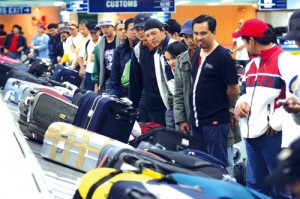Millions of Filipino workers spread across the globe are vulnerable to any act of nuclear terrorism because of their sheer number, Vice President Jejomar Binay, presidential adviser on OFWs said.
“With over 10 million of our kababayans [fellow Filipinos] living and working overseas, any act of nuclear terrorism in any part of the world will inevitably victimize scores of overseas Filipinos,” Binay said on Saturday before leaving for the 2014 Nuclear Security Summit in The Netherlands.
Binay is representing President Benigno Aquino 3rd in the biennial summit. He also represented the President in the 2012 Nuclear Security Summit in Seoul, South Korea.
Binay said the threat of nuclear terrorism is not confined to nations who possess nuclear weapons or operate nuclear power plants, but rather a global problem that demands the attention of the international community.
The biggest concentrations of overseas Filipino workers (OFWs) are in the United States, which has been a prime target for terrorist attacks, and the Middle East, a region that has long been in terrorism’s shadow.
“The Philippines does not possess nuclear material that may be turned into a nuclear weapon by terrorists or other non-State actors, nor does it operate nuclear power plants. Yet the relevance of nuclear security to the Philippines cannot be underestimated,” he said.
“We could become safe havens or transit and staging grounds for those who want to commit acts of nuclear terrorism. Terrorists can steal from radiological sources in our laboratories, factories and hospitals in order to build a ‘dirty bomb’,” the Vice President added.
A “dirty bomb” is a type of a radiological dispersal device that combines conventional explosives, such as dynamite, with radioactive material.
While there is no evidence that any known terrorist group possesses a dirty bomb, at least four, including Al Qaeda, are believed to be interested in acquiring one.
An article in The New York Times in 2012 noted that an improvised nuclear device could be developed from “highly enriched uranium or plutonium being used for civilian purposes. And there is a black market in such material.”
The Times reported there have been “18 confirmed thefts or loss of weapons-usable nuclear material.” And in 2011, police in Moldova “broke up part of a smuggling ring attempting to sell highly enriched uranium; one member is thought to remain at large with a kilogram of this material.”
Binay said that through the commitments made and the cooperative arrangements reached in the past summits, the Philippines has been able to enhance its own security measures, receiving technical and financial assistance from partner states and organizations.
The summit is expected to gather around 53 heads of state, including United States President Barack Obama, who initiated the holding of a summit on nuclear security in 2009.
Obama has said that the “greatest threat to US and global security is no longer a nuclear exchange between nations, but nuclear terrorism by violent extremists and nuclear proliferation to an increasing number of states.”
The first Nuclear Security Summit was held in Washington, DC in 2010.


